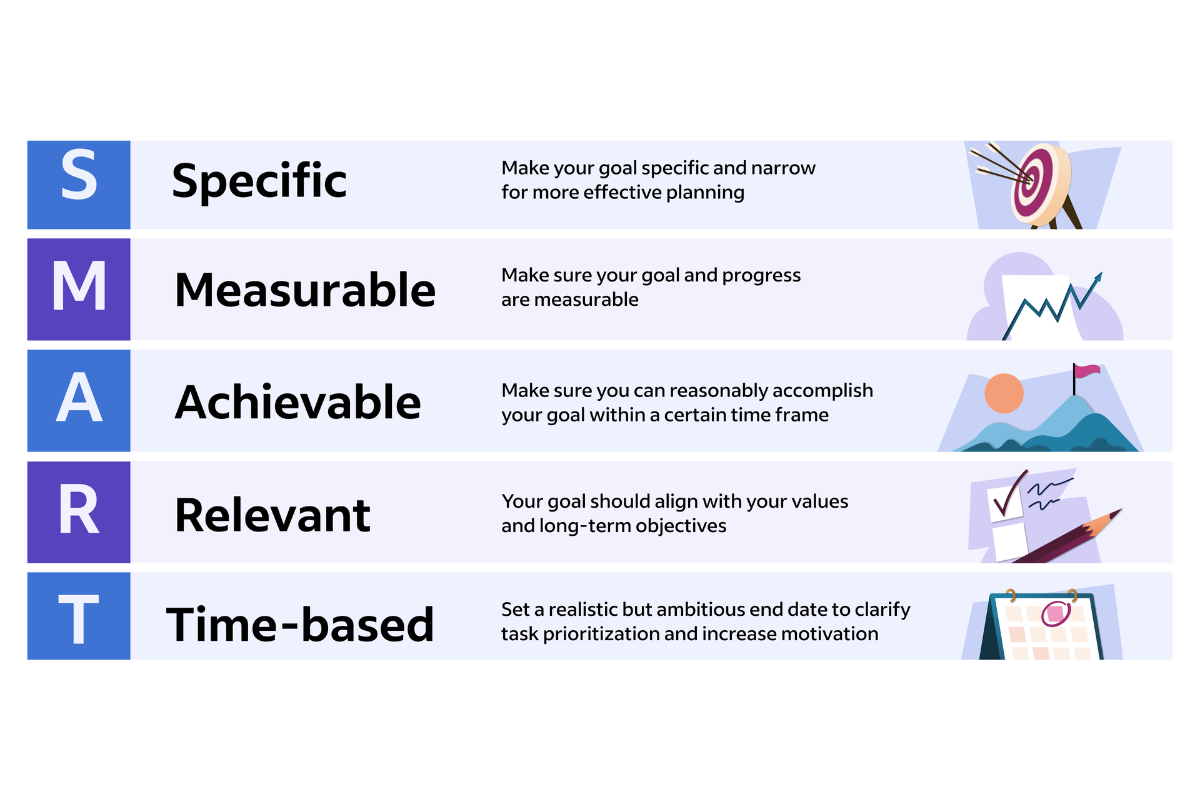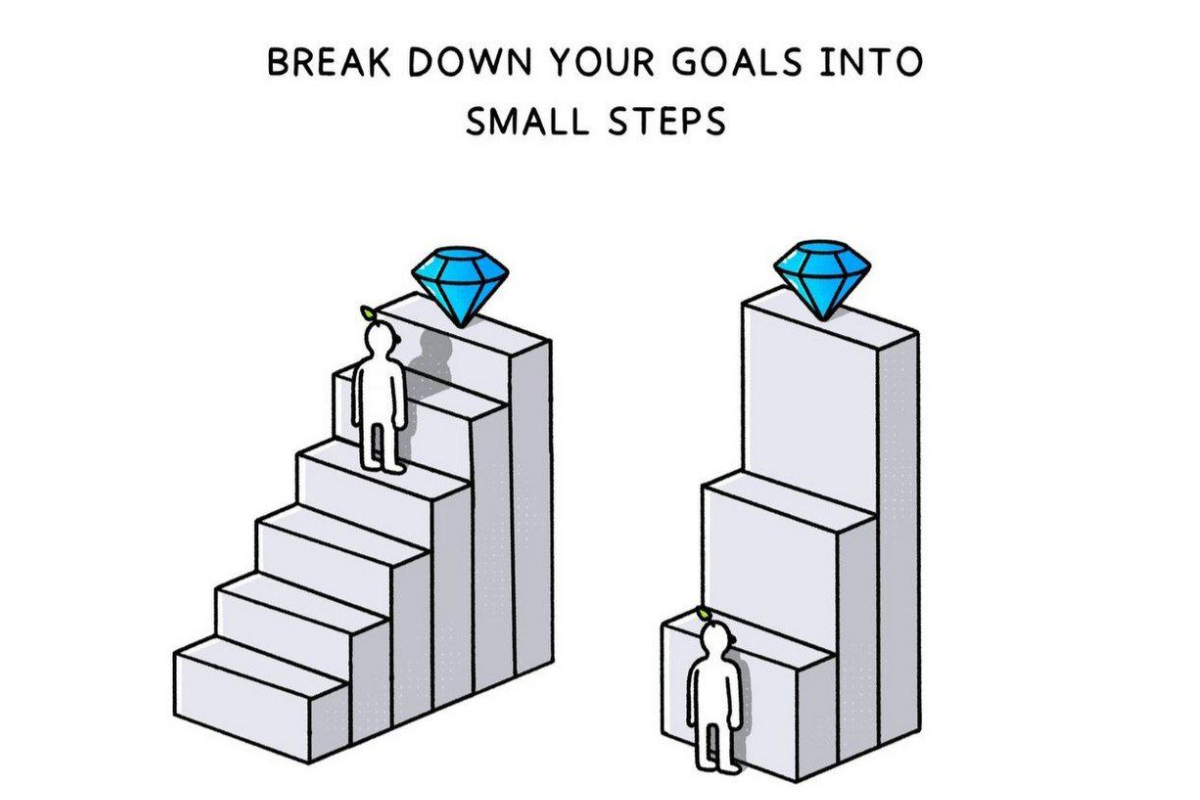Setting goals at the start of a new year is a common practice that provides individuals with a sense of direction and purpose. It catalyzes personal growth and motivation, encouraging people to strive for self-improvement and to make positive changes in their lives.
However, achieving these resolutions can be challenging. Research from the University of Scranton indicates that only 8% of individuals accomplish their New Year's resolutions, highlighting the difficulty many face in reaching their goals.
One key factor in successful goal attainment is the realism and actionability of the goals set. Establishing realistic goals boosts motivation and confidence, making it easier to achieve success. Setting achievable goals reduces stress and anxiety, allowing for a more balanced approach to challenges. Breaking down larger goals into smaller steps makes them manageable and helps track progress.
While setting New Year's resolutions is a positive step toward self-improvement, ensuring that these goals are realistic and actionable is crucial for enhancing personal growth and maintaining motivation throughout the year. With the right approach, you can turn your ambitions into achievable milestones.
So, how can you set goals that truly work? Let’s dive into practical strategies that will help you stay on track and make this New Year your most successful yet.
Reflect on the Past Year

Reflecting on the past year is essential for personal growth and effective goal-setting. By reviewing both successes and setbacks, individuals can identify patterns that inform future endeavors.
Review What Worked and What Didn’t
Encouraging readers to assess their past goals helps them understand what strategies were effective and where improvements are needed. Keeping a journal of achievements and challenges from the previous year can facilitate this reflective process.
Learn from Failures
Viewing failure as a learning opportunity significantly enhances the likelihood of future success. A study published in the Journal of Experimental Psychology: General found that individuals often overestimate their chances of success following a failure, which can impede practical planning and resilience.
The study analyzed responses from 1,800 adults, revealing that participants frequently predicted higher success rates for individuals who had previously failed, across various scenarios. This unfounded optimism can hinder effective learning from past mistakes.
Real-Life Example
Thomas Edison, the prolific inventor, is renowned for his perspective on failure. When developing the electric light bulb, he encountered numerous unsuccessful attempts. Edison famously stated, "I have not failed. I've just found 10,000 ways that won't work," highlighting his view of failures as learning experiences that eventually led to success.
Set SMART Goals

Setting goals is a powerful way to achieve personal growth and professional success. However, the way goals are framed plays a significant role in determining whether they will be achieved. This is where the SMART goal-setting framework becomes essential. SMART goals are specific, measurable, achievable, relevant, and time-bound, providing a clear and structured approach that enhances the likelihood of success.
Being specific is key to setting an effective goal. Without clarity, it’s easy to lose focus and direction. Instead of a vague objective like “Get fit,” a specific goal such as “Exercise three times a week for 30 minutes” is far more actionable. Specificity removes ambiguity and provides a clear path forward.
Measurability ensures that progress can be tracked and evaluated. Goals that include measurable criteria offer a way to gauge success. For example, rather than saying, “Improve my writing,” a measurable goal would be “Write 500 words daily for the next three months.” Measuring progress helps in staying motivated and making necessary adjustments along the way.
Achievability is another critical aspect. Goals should stretch one's limits but remain within reach based on current circumstances. While ambition is important, setting goals that are too far-fetched can lead to frustration and eventual abandonment. For someone with a tight schedule, aiming to “Read one book per month” is more realistic than attempting to read multiple books a week.
Relevance ensures that the goal aligns with broader personal or professional objectives. Setting a goal that matters to your long-term aspirations increases commitment and motivation. If your career goal is to become a certified financial analyst, a relevant short-term goal might be to “Complete the CFA Level 1 exam within the next six months.”
Finally, time-bound goals create a sense of urgency. Without a deadline, goals risk being perpetually postponed. A well-defined timeframe provides motivation to act and track progress. For instance, setting a deadline to “Complete a business proposal by the end of the month” ensures timely execution and accountability.
Dr. Edwin Locke’s groundbreaking research on goal-setting theory supports the importance of this framework. His studies revealed that people who set specific and challenging goals are up to 90% more likely to achieve them compared to those who set vague or easy objectives. Locke’s work underscores that clarity and commitment to well-defined goals, coupled with feedback, enhance performance across various domains.
By adopting the SMART framework, individuals can set goals that are clear, actionable, and achievable, ultimately increasing their chances of success. The key is to take time to thoughtfully craft goals that matter, break them down into manageable steps, and commit to consistent progress. In doing so, goal-setting becomes less of a daunting task and more of an empowering tool for positive change.
Break Goals into Smaller Steps

Breaking down large goals into smaller, manageable tasks is a proven strategy to enhance productivity and maintain motivation. This approach, often referred to as "micro productivity," makes daunting objectives more approachable and reduces the tendency to procrastinate.
For instance, instead of setting an overarching goal like "write a book," focusing on writing 500 words daily can lead to steady progress and prevent feelings of overwhelm. This method not only simplifies the process but also provides a clear, actionable plan that can be followed consistently.
Research supports the effectiveness of this technique. A study from the Wharton School at the University of Pennsylvania found that breaking down big work goals into smaller components can significantly enhance long-term success.
By subdividing goals, individuals can focus on immediate tasks, leading to a sense of accomplishment and sustained motivation. This structured approach facilitates progress tracking and allows for adjustments as needed, ultimately contributing to the successful attainment of larger objectives.
Incorporating micro-productivity into daily routines can transform how we approach complex tasks, making them more manageable and increasing the likelihood of achieving our goals. By focusing on small, consistent actions, we build momentum and develop habits that support long-term success.
Stay Accountable
Maintaining accountability is crucial for achieving goals, and having an accountability partner or group can significantly enhance success rates. Research indicates that individuals who commit their goals to someone else are 65% more likely to accomplish them. Moreover, scheduling regular check-ins with an accountability partner can increase the likelihood of success to 95%.
Tracking progress is equally important in goal attainment. Utilizing tools such as apps, journals, or planners enables individuals to monitor their development, make necessary adjustments, and maintain motivation. Celebrating small milestones along the way can provide positive reinforcement and sustain momentum.
Here are some recommended goal-tracking apps to assist in this process:
A versatile project management tool that excels at tracking goals for individuals and teams. It offers customizable views, goal-setting features, and progress tracking to keep you organized and on target.
Strides
Ideal for setting a productive daily routine, Strides allows you to track habits and goals with customizable trackers, progress charts, and reminders to help build consistency.
Way of Life
This app focuses on building new habits by providing a simple, intuitive platform to track your routines, identify patterns, and stay motivated through visual feedback.
Coach.me
Designed for personal growth and skill development, Coach.me offers habit tracking along with access to a community of coaches to provide guidance and support.
Habitica
By gamifying habit-building, Habitica turns your goals into a fun game, rewarding you for completing tasks and helping you stay engaged through a role-playing experience.
Embrace Flexibility
Embracing flexibility in goal setting is essential, as life often presents unforeseen challenges that require us to adapt our plans. Rigid goals can become obstacles rather than guideposts, stifling creativity and hindering progress.
Adapting to Change
When circumstances shift, it's important to reassess and adjust our objectives. If a goal becomes unrealistic, revising it rather than abandoning it entirely allows for continued progress and personal growth. This adaptability enables us to navigate obstacles effectively and maintain momentum toward our aspirations.
Real-Life Example: Oprah Winfrey
Oprah Winfrey's journey exemplifies the power of adapting to change and overcoming adversity. Born into poverty and facing numerous hardships, including abuse and discrimination, she continually adjusted her goals to align with her evolving circumstances.
Starting her career in radio and local television, Oprah faced setbacks but remained resilient. Her ability to adapt led her to create "The Oprah Winfrey Show," which became one of the highest-rated talk shows in television history. Beyond her show, she expanded into acting, producing, and philanthropy, consistently aligning her goals with her passions and the changing media landscape. Oprah's story illustrates that flexibility in goal setting, coupled with determination, can lead to extraordinary success.
Overcome Common Obstacles

Overcoming common obstacles like procrastination and lack of motivation is essential for achieving personal and professional goals.
Procrastination
Procrastination, the act of delaying tasks, affects a significant portion of the population. Research by Dr. Piers Steel indicates that approximately 80% to 95% of college students procrastinate, particularly with coursework.
- Solution: The 2-Minute Rule
Implementing the "2-minute rule" can effectively combat procrastination. This strategy suggests that if a task takes two minutes or less, it should be done immediately. This approach reduces the tendency to delay and helps build momentum for tackling more substantial tasks.
Lack of Motivation
A lack of motivation can hinder progress toward goals. Revisiting the underlying reasons behind a goal can reignite motivation. Understanding the personal significance of a goal enhances commitment and drive.
- Solution: Visualization
Visualizing the successful achievement of a goal and the benefits it brings can enhance motivation. This mental imagery creates a positive association with the outcome, making the pursuit more compelling. Additionally, setting clear objectives and breaking tasks into smaller steps can reduce overwhelm and build momentum.
By addressing procrastination with immediate action strategies and enhancing motivation through personal reflection and visualization, individuals can overcome these common obstacles and make meaningful progress toward their goals.
Reward Yourself

Rewarding yourself during goal pursuit is a powerful motivator that reinforces positive behavior and enhances persistence. Immediate rewards, in particular, have been shown to significantly boost intrinsic motivation, making tasks more enjoyable and increasing the likelihood of continued engagement.
Why Rewards Matter
Incorporating immediate rewards into goal-related activities can transform the pursuit into a more enjoyable experience, thereby enhancing intrinsic motivation. Research by Kaitlin Woolley and Ayelet Fishbach indicates that immediate rewards are a stronger predictor of persistence in goal-related activities than delayed rewards. Their studies demonstrate that individuals who experience immediate rewards during activities like exercising or studying are more likely to persist in these activities over time.
- Example: Treating Yourself After Milestones
Implementing immediate rewards can be as simple as treating yourself to something enjoyable after completing a milestone. For instance, after finishing a challenging work task, you might take a short break to enjoy a favorite snack or engage in a relaxing activity. This practice not only provides immediate pleasure but also creates a positive association with task completion, fostering a cycle of motivation and reward.
Data Insight
The research by Woolley and Fishbach underscores the impact of immediate rewards on goal adherence. Their findings suggest that the presence of immediate rewards can significantly enhance persistence in goal-related activities, even more so than delayed rewards.
In summary, integrating immediate rewards into your goal-setting strategy can make the pursuit more enjoyable and increase the likelihood of achieving your objectives. By acknowledging and celebrating small milestones with immediate rewards, you reinforce positive behavior and maintain motivation throughout your journey.
As another year begins, it’s a chance to reflect, reset, and realign with what truly matters. Setting goals isn’t just about creating a list of ambitions—it’s about crafting a roadmap for meaningful progress. The journey to achieving your goals may not be perfect, and that’s okay. What truly counts is your commitment to showing up, learning from setbacks, and moving forward.
By setting SMART goals, you create clarity. Breaking those goals into smaller, actionable steps makes the process less overwhelming. Staying accountable—whether through a partner, group, or personal tracker—keeps you motivated. And embracing flexibility ensures you adapt when life throws unexpected challenges your way. Progress isn’t linear, but every small step you take brings you closer to where you want to be.
Remember, success isn’t about grand leaps but consistent, intentional actions. The little wins, the moments you choose to keep going, and the lessons you learn along the way are what make the difference. You don’t have to wait for the perfect time or feel ready; start now, start small, and let those small efforts build into something remarkable.
So this year, be kind to yourself, stay consistent, and keep moving forward. Whatever your goals—personal growth, career milestones, or simply becoming the best version of yourself—know that progress, not perfection, is the key, make this year the one where you achieve what truly matters to you.
Also Read:

















